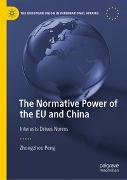Read more
"The Normative Power of the EU and China: Interests Drive Norms is a vital contribution to the scholarship on global governance. It deftly dissects how both the EU and China pursue norm diffusion not as idealistic projects but as interest-driven strategies. The book provides a much-needed corrective to overly simplistic conceptions of 'normative power'."
—Richard G. Whitman, Professor, School of Economics, Politics and International Relations, University of Kent, UK
"Zhongzhou Peng has written a very welcome recent addition to the normative power approach literature. His balanced book seeks to understand how the normative power of China compares with the EU in global governance. The analysis compares and contrasts the EU and China to provide an interesting new take on how direct diffusion is driven by different interests rather than normative concerns."
—Ian Manners, Professor, Department of Political Science, Lund University, Sweden
This book systematically examines how the EU and China exercise their normative power in global governance, and how they interact with each other in the Asian Infrastructure Investment Bank, the Paris Agreement, and the United Nations Human Rights Council. It demonstrates that the interests of the EU and China constitute a predominant factor that shapes their norm interpretation, norm diffusion, and outcomes of norm diffusion. The book makes the case that international norms represent a deal that fulfils the interests of actors that exercise normative power in international institutions. These findings make important theoretical and empirical contributions to the literature on normative power, EU-China relationship, and global governance.
Zhongzhou Peng holds a PhD in international relations from the University of Melbourne, Australia, and was a post-doctoral fellow at Fudan University, China. He has published extensively on China’s normative power, EU-China relationship, and Chinese foreign policy.
List of contents
Chapter 1: Introduction.- Chapter 2: The Normative Power of the EU.- Chapter 3: The Normative Power of China.- Chapter 4: The EU, China and the Asian Infrastructure Investment Bank: Norm Divergence and Compromise in International Financial Governance.- Chapter 5: The EU, China and the Paris Agreement: Norm Divergence and Compromise in International Climate Change Governance.- Chapter 6: The EU and China in the United Nations Human Rights Council: Politicalised Normative Power.- Chapter 7: Conclusion: Norms Driven by Interests.
About the author
Zhongzhou Peng holds a PhD in international relations from the University of Melbourne, Australia, and was a post-doctoral fellow at Fudan University, China. He has published extensively on China’s normative power, EU-China relationship, and Chinese foreign policy.
Summary
"The Normative Power of the EU and China: Interests Drive Norms is a vital contribution to the scholarship on global governance. It deftly dissects how both the EU and China pursue norm diffusion not as idealistic projects but as interest-driven strategies. The book provides a much-needed corrective to overly simplistic conceptions of 'normative power'."
—Richard G. Whitman, Professor, School of Economics, Politics and International Relations, University of Kent, UK
"Zhongzhou Peng has written a very welcome recent addition to the normative power approach literature. His balanced book seeks to understand how the normative power of China compares with the EU in global governance. The analysis compares and contrasts the EU and China to provide an interesting new take on how direct diffusion is driven by different interests rather than normative concerns."
—Ian Manners, Professor, Department of Political Science, Lund University, Sweden
This book systematically examines how the EU and China exercise their normative power in global governance, and how they interact with each other in the Asian Infrastructure Investment Bank, the Paris Agreement, and the United Nations Human Rights Council. It demonstrates that the interests of the EU and China constitute a predominant factor that shapes their norm interpretation, norm diffusion, and outcomes of norm diffusion. The book makes the case that international norms represent a deal that fulfils the interests of actors that exercise normative power in international institutions. These findings make important theoretical and empirical contributions to the literature on normative power, EU-China relationship, and global governance.

